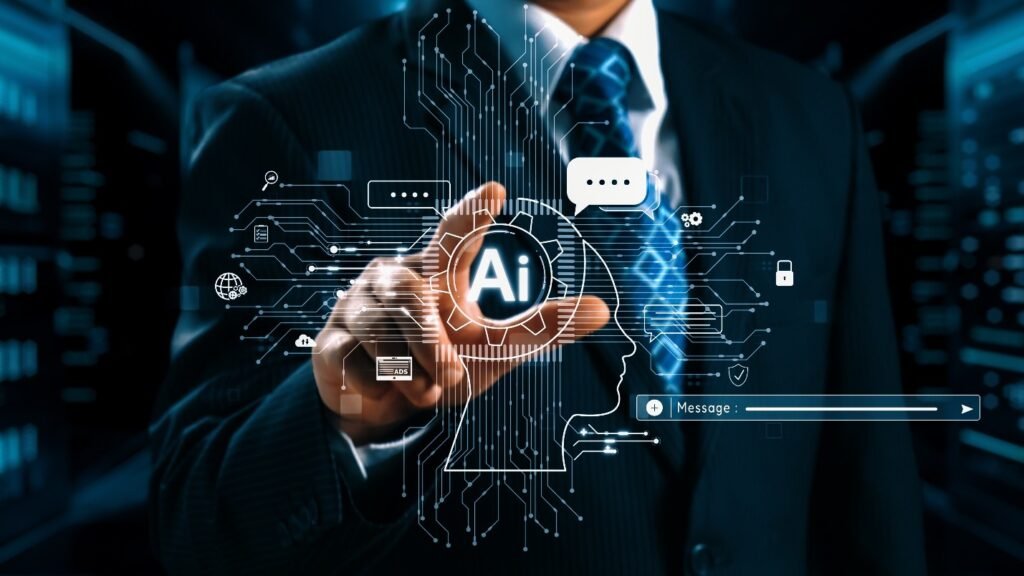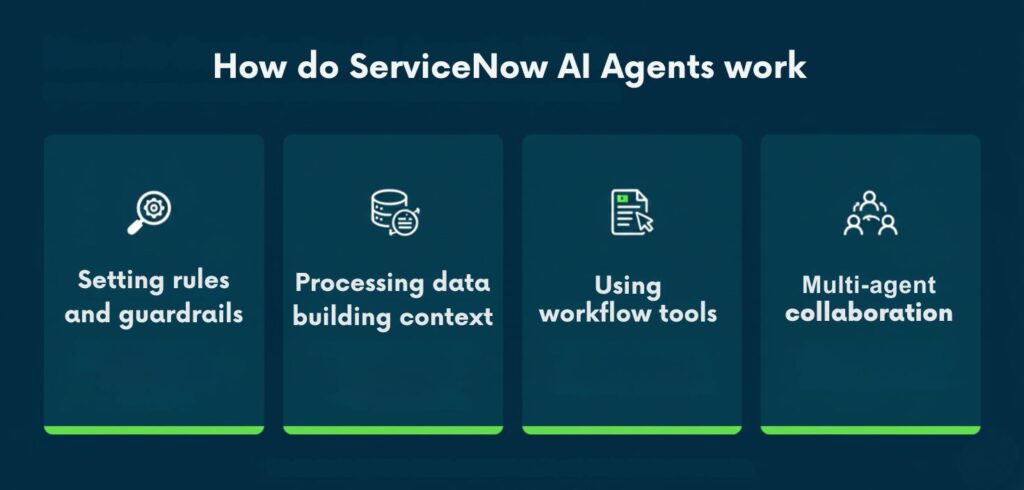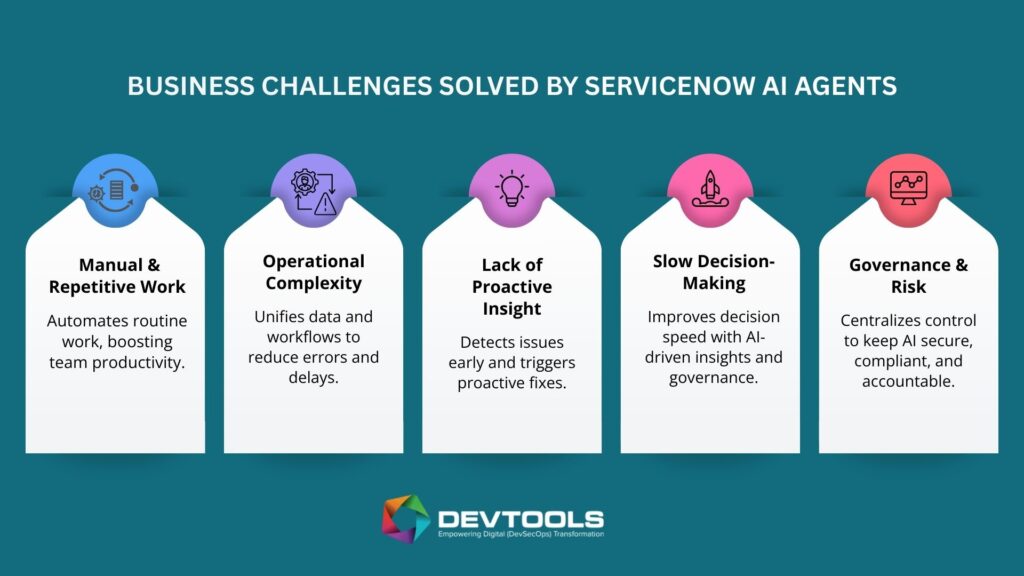ServiceNow AI Agents: Unlocking Next‑Generation Workflow Automation
Empower your enterprise with DevTools’ ServiceNow AI Agents. Optimize operations, enhance service delivery, and drive innovation. Book a free consultation now!
14 +
Years of Experience
550 +
Happy Customers
250 +
Years of Tech Leadership Exp.

"License Reseller" and "Consulting & Implementation" Partner

TL;DR
- ServiceNow AI Agents combine LLM intelligence with workflow automation to handle tasks autonomously across IT, HR, and customer service.
- AI Agent Studio enables no-code customization, while the AI Agent Orchestrator coordinates multiple agents for complex, cross-department workflows.
- Emerging trends like hyperautomation, decision intelligence, personalized experiences, and responsible AI are reshaping business operations in 2026.
- DevTools helps organizations deploy, govern, and scale ServiceNow AI Agents through implementation, orchestration, training, and continuous optimization.
AI is rapidly evolving, and organizations across various industries are leveraging it to significantly boost productivity. ServiceNow’s latest releases in Xanadu & Yokohama demonstrate this more clearly. ServiceNow added thousands of preconfigured ServiceNow AI agents with the Yokohama release and later updates.
These agents easily combine large-language-model (LLM) instructions with workflow actions. These are more than just the traditional chatbots; they are digital friends that can work on their own, understand business data, make decisions, and carry out tasks from beginning to end. In this article, let’s look at what ServiceNow AI agents can do, the new trends that are shaping the future, and how DevTools can help you in your AI adoption journey.
What are ServiceNow AI Agents?
ServiceNow AI Agents are intelligent, autonomous systems built on the ServiceNow AI Platform that gather contextual data, make informed decisions, and execute workflows across IT, HR, customer service, and other business domains, all within predefined guardrails and human-in-the-loop governance.
They are designed to support IT teams, HR departments, customer service operations, finance functions, and security use cases by reducing manual work and enabling faster, more accurate execution of everyday tasks. These agents bring a new level of intelligence and autonomy to enterprise workflows.
How do ServiceNow AI Agents Work?

ServiceNow AI Agents work through a simple but powerful sequence that ensures accuracy and control:
1. Setting rules and guardrails
You define the role, personality, boundaries, and outcomes using natural language. Guardrails keep agents aligned with policy.
2. Processing data and building context
Agents learn from platform data, knowledge articles, interactions, logs, and third-party systems to understand scenarios.
3. Using workflow tools
Agents make use of flow actions, subflows, APIs, queries, remedial actions, and scripts to complete tasks.
4. Multi-agent collaboration
Using the AI Agent Orchestrator, multiple agents collaborate without conflict. Each plays its part to achieve the overall business outcome.
This structured approach ensures consistent results with minimal manual intervention.
Core Capabilities of ServiceNow AI Agents
- Autonomous operation: Execute tasks without constant supervision
- Agent-to-agent collaboration: Agents work together across workflows
- Text-to-action automation: Trigger complex workflows by typing a request
- Continuous learning: Improve performance through outcomes
- Human-in-the-loop controls: Approvals flow back to human reviewers
- Cross-system integration: Works with external models (GPT, Gemini, Claude)
- Built-in governance: Full visibility into activity, metrics, and risk controls
- Multi-modal AI: Ability to consume text, voice, images (upcoming improvements)
These capabilities make ServiceNow AI Agents powerful and enterprise-ready.
A spectrum of AI agents for business outcomes
ServiceNow AI Agents are intelligent, autonomous systems built on the ServiceNow AI Platform that gather contextual data, make informed decisions, and execute workflows across IT, HR, customer service, and other business domains, all within predefined guardrails and human-in-the-loop governance.
ServiceNow puts AI agents into ready-to-use packages that are meant for certain areas. Here are a few examples to show how many options there are:
- Security operations (SecOps) expert agents make the whole incident lifecycle easier by getting rid of repetitive tasks. This lets security teams focus on stopping threats faster than ever. An AI agent collects data, links events, and starts remediation workflows instead of manually sorting alerts and opening tickets.
- Autonomous change-management agents act like experienced change managers. By looking at past data and figuring out how risky something is, they automatically make plans for implementation, testing, and backing out. These agents make it less likely that deployment errors will happen and speed up the release cycles.
- Proactive network test and repair agents are like AI-powered problem solvers. They keep an eye on the health of the network all the time, find problems, figure out what’s causing them, and start repairs before users even know there’s a problem.
- Operational‑technology (OT) knowledge‑generation agents automatically create knowledge articles with contextual information after an incident is resolved. By capturing resolutions in a structured way, they enrich the knowledge base without human intervention.
- ITSM incident categorization agents look at incident descriptions and configuration item data to find the right category and subcategory. This makes routing more accurate and speeds up resolution.
- Post-incident review generation agents put together executive summaries, impact assessments, and action items from records of incidents.
These examples all show the same thing: AI agents are made to take care of routine tasks that people usually have to do. They free up your employees to work on strategic projects and talk to customers.
Customize agents with AI Agent Studio
Out‑of‑the‑box agents provide immediate value, but every organization has unique processes. ServiceNow anticipated this requirement and introduced AI Agent Studio, a no‑code environment where you can describe an agent’s role in natural language. You specify the outcome you want and any processes or policies that must be followed. Then, AI Agent Studio puts together the tools and instructions it needs. For instance, a retail store could make a “returns triage agent” that looks at return requests, checks the customer’s purchase history, and provides refunds in line with the store’s policies. This kind of customization makes sure that AI agents follow your company’s rules.
Orchestrating a team of AI agents
The real magic happens when agents collaborate. The AI Agent Orchestrator works with multiple AI agents to accomplish a series of tasks. When a workflow starts, the orchestrator plans, reasons, and calls on the available agents to achieve the goal. Consider a banking example: agents detect a spike in error logs on the core banking server; they confirm that the incident threshold has been met and raise a high‑priority ticket. Other agents analyze systems involved in account creation, identify the problem, and recommend resolutions. Orchestrator provides a control tower that ensures agents cooperate efficiently across departments while following organizational policies. You remain in charge, with full visibility into decisions and outcomes.
Agentic AI trends shaping 2026
Experts at ServiceNow have found seven trends that will shape agentic AI in the next few years. People who make decisions can plan better when they know about these trends.
1. Hyperautomation with agentic intelligence
Hyperautomation combines technologies such as machine learning and robotic process automation to automate the parts of a business process. Agentic AI goes beyond hyperautomation by adding reasoning and critical thinking capabilities to automated processes. Agents don’t just follow rules that have already been set; they also look at the situation, learn from what happens, and then act on it by taking an action. This means that the automation can handle complicated and dynamic situations that used to need human help. Some examples are routine decision-making tasks, doing tasks on your own, and learning by working with people and other AI agents.
2. AI-powered decision intelligence
In the third wave of AI, LLMs and agentic AI work together to give us AI-powered decision intelligence. These systems don’t just guess what will happen next; they use real-time data to make decisions. Decision intelligence and agentic AI work well together. Together, they let operations, customer service, and business planning make decisions on their own. For instance, an agent could look into problems in the supply chain and suggest other options while also carrying out approved actions.
3. Personalized employee experiences
Agentic AI gives employees personalized experiences at every stage of their journey. In HR, self-driving agents help new hires with onboarding, answer their questions, set up accounts, and sign them up for benefits. They identify the skill gaps and recommend training. In daily operations, they automate routine tasks such as time‑off requests or benefit queries, which leaves the HR team to focus on bigger tasks/initiatives. Agents provide real‑time personalized feedback and goals and suggest internal communities, connections, and mentoring opportunities. By personalizing interactions, agentic AI boosts employee engagement and development.
4. Enhanced customer interactions
Customers increasingly expect instant, empathetic service when they raise issues/concerns or even just ask for help. ServiceNow’s survey shows that 24/7 availability and quick response are ranked highest among the desired features. ServiceNow Agentic AI offers efficient issue resolution, personalized recommendations, and multi‑channel support, as it has context with one data model. This frees up human representatives to focus on complex tasks.
5. AI for sustainability
ServiceNow Agentic AI can help with more than just operational efficiency; it can also help with better resource use and sustainability. AI Agents can monitor real-time data about the energy use, water use, and waste, and take steps to make processes better. They help businesses find sustainable supply chains, improve product lifecycle design, and change how they do things to lower their carbon footprint. Agentic AI gives leaders the information they need to meet environmental goals and follow regulations, as well as the tools to do so automatically.
6. AI Democratization
One reason AI adoption may have lagged is due to the reason that it requires expertise in developing and maintaining models. ServiceNow Store has access to more than 2000+ AI agents with pre‑built examples and tools that allow businesses to experiment and learn. Organizations can select the tools for their use cases without being locked into one provider, as the ServiceNow AI agent can leverage native LLMs or third‑party models like GPT, Gemini, or Claude.
7. Responsible AI and Ethical Considerations
Addressing ethics and governance in AI discussions is very important. The ServiceNow AI Control Tower (explained below) offers centralized tools to track AI performance, enforce governance, maintain compliance, and manage risk . As regulation increases, enterprises must have visibility into how AI is used and ensure that outcomes are fair, transparent, and accountable. Responsible AI becomes a competitive differentiator when customers and employees know that their data and experiences are treated respectfully.
ServiceNow AI Control Tower – Governance and Visibility

When there are a lot of models, data sources, and vendors involved, AI projects can get out of hand very quickly. ServiceNow AI Control Tower solves this problem by giving the whole company a central place to manage and control all of its AI models and assets. It connects AI projects to core business services and technology by using the ServiceNow AI Platform.
Key features include:
- Align AI with strategy: Control Tower helps you prioritize projects that deliver maximum business value. It provides context so that initiatives support corporate goals rather than isolated experiments/projects.
- Streamline AI operations: Automated workflows optimize processes and encourage collaboration from start to end of the projects.
- Enhance performance: Continuous monitoring highlights improvement areas and informs data‑driven investment decisions.
- Manage risk and compliance: The Control Tower enforces governance, leveraging the real‑time insights that mitigate risk, and maintains regulatory compliance.
- Unify AI, data, and workflows: The Control Tower uses one data model and configuration management database to integrate AI into the required workflows across required business processes.
- Connect AI to IT: Control tower maps the AI assets and their relationships to business services, simplifying decision-making. Integrated security ensures all initiatives meet the strict standards.
- Integrate any AI: Control Tower works with internally built, third‑party, or agentic AI models.
For leaders like the chief AI officer, CIO, CTO, or risk and security managers, these capabilities provide the visibility needed to scale AI confidently.
Business challenges solved by ServiceNow AI agents

Organizations adopt AI to solve real problems. AI agents help teams address several challenges that they commonly face:
- Manual, repetitive work: Many IT and business tasks require collecting, sorting, and documenting data on a routine basis. AI agents can do this repetitive task so that teams can work on new ideas/solve complex tasks.
- Operational complexity: Legacy tools and disconnected tools make operations slow, impact productivity, and are error‑prone with a very high percentage. Agents solve this by having a unified platform with data and workflows, delivering end‑to‑end automation, cutting down on errors, and increasing productivity.
- Lack of proactive insight: Traditional & legacy tools react to incidents after they occur, which is reactive. AI Agents proactively detect issues such as network anomalies or any incidents and initiate a task for remediation, notifying required stakeholders.
- Slow decision-making: AI projects that aren’t managed well can cause problems with risk and compliance. The AI Control Tower makes sure that AI is used responsibly and governs it.
- Governance and risk: Unmanaged AI initiatives create risk and compliance headaches. The AI Control Tower centralizes governance and enforces responsible AI practices.
ServiceNow AI agents help businesses become faster, more resilient, and more focused on their customers by fixing these problems.
How DevTools can help you deploy AI agents
DevTools is a ServiceNow partner headquartered in Bengaluru, India, with expertise in the implementation of the ServiceNow platform across various industries.
AI Agent Implementation Process
- DevTools helps in the implementation of AI Agents for various use cases.
- We look at the current workflows, the quality of the data, and the long-term goals, including factors such as scalability and flexibility, to find places where AI agents can help right away.
- This makes sure that everything follows the rules and is in line with your business goals.
Agent Setup and Customization
- The next step is to set up and customize agents.
- We do this with AI Agent Studio, which lets us make agents that fit your policies, processes, and culture.
- For example, we can create agents that are only useful for a certain field, like following Indian laws or working in a certain industry.
Workflow Setup and Orchestration
- Following this, we set up workflows.
- Our architects add an AI Agent Orchestrator to your current ServiceNow instance to make sure that agents work together and do their jobs well.
- We set up alerts and monitoring so you can stay in charge.
AI Control Tower and Governance
- It’s very important to get the AI Control Tower up and running.
- We set up and run AI Control Tower to manage your AI ecosystem.
- We help you make sure that your AI projects follow the rules and stay in line with your strategy by helping you set up governance policies, risk frameworks, and performance metrics.
Training and Change Management
- AI agents change how people work.
- DevTools offers training and change management programs to make sure people use it.
- We give your teams the tools they need to adapt to agentic workflows and create their own agents over time.
Ongoing Support for More AI Adoption
- The more you use AI systems, the better they get.
- DevTools keeps an eye on how well agents are doing and makes small changes to their instructions to make sure your AI investments keep paying off.
Conclusion
ServiceNow AI agents are a big step forward in automating businesses. ServiceNow AI Agents can be used for use cases such as security, change management, network operations, knowledge management, and more. AI Agent Studio and the AI Agent Orchestrator help change and coordinate them. Agentic AI trends show a future with hyper automation, decision intelligence, personalized experiences, better interactions with customers, and sustainability. The AI Control Tower gives you the control and visibility you need to grow AI in a governed & responsible way.
AI agents aren’t coming; they’re already here. You can adopt ServiceNow AI agents in an effective & controlled way by partnering with a trusted partner like DevTools. This will speed up the transformation while keeping you in charge. Get in touch with us to find out how AI agents can help your organization automate the processes & workflows.
FAQs
What is an AI agent in ServiceNow?
An AI agent in ServiceNow is an intelligent, autonomous system that understands context, makes decisions, and completes tasks using LLM-powered intelligence and workflows. It acts like a digital teammate that handles routine work across IT, HR, customer service, and other business areas.
What is the ServiceNow AI agent orchestrator?
ServiceNow AI Agent Orchestrator enables inter‑agent communication and centralized coordination. This ensures AI agents can efficiently share information and hand off tasks regardless of where the process starts, making them indispensable for managing complex workflows.
What industries can benefit most from ServiceNow AI Agents?
Telecommunications, Media and Technology, Financial Service Operations, Banking, Insurance, Public Sector Digital Services, Retail Operations, and Retail Service Management
Are ServiceNow AI Agents safe and compliant?
ServiceNow AI Control Tower enforces AI governance best practices. It helps gain real-time insights to mitigate risks, maintain compliance, and adopt AI with confidence.
How can my organization start using ServiceNow AI Agents?
First, you need to install the Now Assist plugin, then enable the Now Assist Panel, and create and configure agents for your organization using AI Agent Studio.

Pramodh Kumar M is a Solutions Architect at DevTools with over 6 years of specialized experience in DevSecOps and enterprise IT solutions. He holds multiple advanced certifications, including Certified Kubernetes Security Specialist (CKS), GitHub Advanced Security, and Azure Solutions Architect Expert. Pramodh specializes in Agile, Cloud & DevOps toolchain implementations, with extensive hands-on experience helping enterprises with digital transformation initiatives. His expertise extends to ServiceNow implementation and support. He is passionate about sharing practical insights on Cloud, DevOps, Automation, and modern IT operations.




